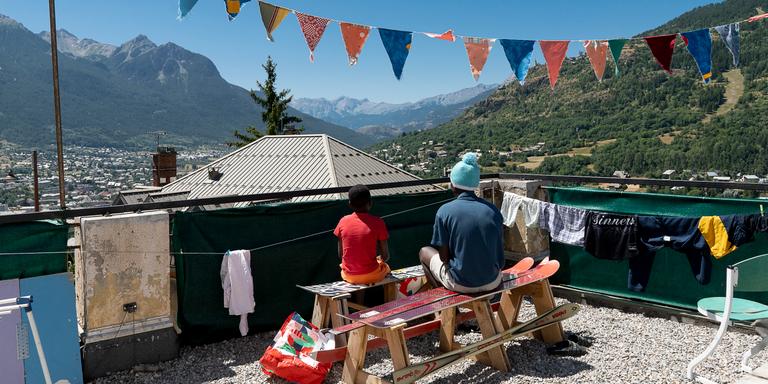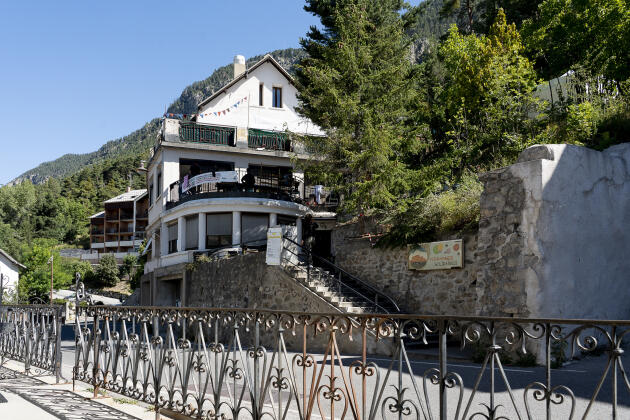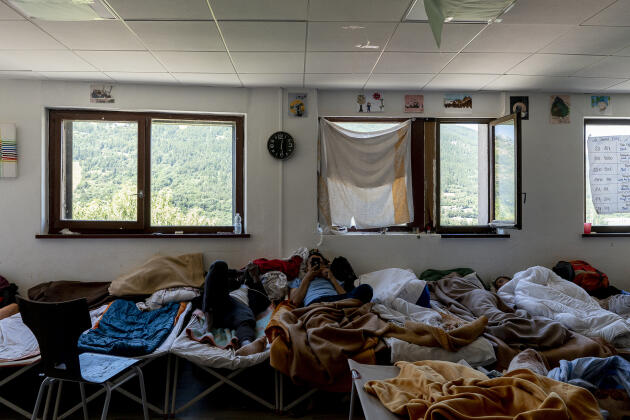


In the city of Briançon, welcoming migrants is becoming increasingly complicated: 'It's no longer manageable'
FeatureSince May, a growing influx of people has been converging to Les Terrasses Solidaires reception center in the French alpine town. Volunteers are struggling to accommodate these newcomers with dignity.
"A lot of walking in the desert... It's not easy... Tunisian police running behind me... Walking for five days, no water, no shade..." He did not stop. Without being asked the slightest question, Issouf (those referred to by their first names did not wish to give their names), started talking about the migratory journey he embarked on almost six months ago from Burkina Faso, alongside his father Abdoul. The 10-year-old showed off his legs, which were riddled with scars, and the pebbles on which he would often fall. "I've seen dead bodies, people dying. The Sahara killed people, ask Dad! I'm telling the truth," he continued, waving his arms.
After crossing Mali, Algeria and Tunisia, Issouf and his father crossed the Mediterranean to the Italian island of Lampedusa. "My mom didn't want us to cross, she was scared, she said: 'Turn around'. We risked our lives. Everyone's laughing now. They're happy."
At the end of July, Issouf and Abdoul crossed the Montgenèvre Alpine pass, near the border between Italy and France, on foot. It is a route that took off at the end of 2016, in the face of an upsurge in police checks in the Alpes-Maritimes. Issouf and Abdoul were turned back a first time by French police, before succeeding in their crossing and reaching Briançon (Hautes-Alpes), some 15 kilometers away. We met them at Les Terrasses Solidaires, a former sanatorium in the town, bought out for €1 million in 2021 by a handful of foundations and associations such as Refuges Solidaires, Médecins du Monde and Tous Migrants, where transit migrants are now welcomed.
'My back was against the wall'
"Inchallah, we'll find the documents and get Mom to France," Issouf told us, talkatively. His father, Abdoul, was in a tough spot. He left his wife and two children in an "unbearable" Burkina, plagued by "insecurity" and economic "crisis." He lived in Koudougou, the country's third-largest city, under pressure from jihadist groups. "Everything collapsed," he said, weeping. "I could have become a jihadist, my back was against the wall. If you're not strong-minded, you can't do anything to get out of it."


He recounted every stage of his journey to France: The nights hiding in olive groves waiting quietly for the smugglers, the CFA francs paid at each stage, the pickup trucks and exhausting walks, the many pushbacks from Tunisia to Algeria, the odd jobs as a mason's assistant that paid 30 dinars [€8.80] a day, the "good-faith" people who offered him food and drink, and the frightening ones who rounded up the "blacks" and sent them off into the desert. Since May, there has been a growing influx of people to Les Terrasses Solidaires, in connection with the increase in departures from Tunisia (which is plagued by an economic crisis and a rise in violence against sub-Saharan migrants.) At night, as many as 70 arrive at the shelter. In recent days, the number of people accommodated on site has risen to more than 200, almost exclusively men, while security standards limit the capacity of the place to 60 people.
You have 47.96% of this article left to read. The rest is for subscribers only.
